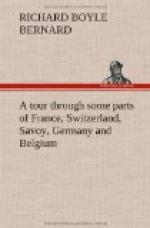The various revolutions of the last twenty-five years have doubtless contributed, in no small degree, to diminish much of that gaiety, which formerly distinguished the French from most other nations, and which formed one of their chief characteristics.
Under the late government reserve was positively necessary, so numerous were the emissaries of the police, and so anxious were they to report the most trifling circumstances to their employer, that they might convince him how very necessary they were to the furtherance of his government. In those unhappy times every man mistrusted his neighbour, fearing he might be concerned in one of the eighteen police establishments supported by the mistrust of the emperor in the affections of his subjects. The Conscription Laws, and the right which Buonaparte assumed of disposing in marriage all ladies possessed of a certain income, as a measure of rewarding the services of his officers, and which violated the closest connexions and best interests of society; together with his system of forced loans, which entirely destroyed the rights of private property, did not leave his subjects many incitements to mirth—although it was dangerous to appear dejected. “The Voyage Descriptif et Philosophique de Paris, par L—— P——,” contains the following remarks, the truth of which renders them interesting, and I shall therefore translate them, for the information of those who may chance to peruse these pages. The author observes, “An air of inquietude has succeeded that openness and sociability, which so much distinguished the French. Their serious air announces that most people are considering the amount of their debts, and are always put to expedients. One guesses, that in a company of thirty at least twenty-four are revolving the means of acquiring wealth; and notwithstanding twenty are without it.” I shall quote in conclusion what the same writer says of the Parisian, and which strikes me as a correct statement. “The Parisian is in general tolerably indifferent as to his political situation; he is never wholly enslaved, never free. He repels cannon by puns, and links together power and despotism by witty epigrams. He quickly forgets the misfortunes of the preceding day; he keeps no diary of grievances, and one might say, he has sufficient confidence in himself not to dread too absolute a despotism. It is to be hoped, that the happy restoration of the Bourbons will restore to the Parisian his gaiety, and that Louis XVIII. the legitimate father of the French, will cause all former political convulsions to be forgotten.”
The Parisians are distinguished by their loquacity. Having occasion to employ a hair-cutter, I was quite stunned by his volubility of tongue. King Archelaus would find it difficult to be suited here; for being asked how he would have his hair cut, he answered—“silently.”




